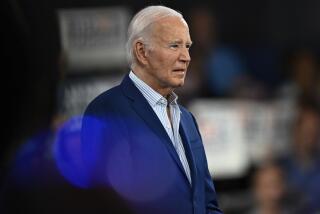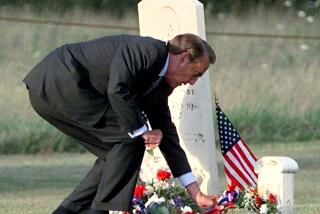Dole Focuses on His War Injuries in Medical Center Tour
WASHINGTON — Republican presidential candidate Sen. Bob Dole continued his effort to reintroduce himself to voters Friday, touring a rehabilitation hospital and chatting with disabled patients in an appearance that focused new attention on his World War II injuries
The tour of the medical center, only a few miles north of the Capitol, was intended to overcome public ignorance of Dole’s disabilities--the result of heroism that he displayed as a 22-year-old Army second lieutenant 51 years ago in Italy.
Like his stunning Senate resignation announcement earlier this week, Dole’s effort to call attention to his withered right arm is a gamble that could have the intended effect of showing voters that the presumed Republican presidential nominee is tough, determined and compassionate, or could work against him.
Political analysts say that bringing attention to his war injuries could not only drive home the fact that he is disabled, but serve as a reminder of his age--72--which together might suggest he is not up to the task of being president.
On the campaign trail, Dole has sought to overcome such risks by telling voters that his injuries, and the 39 agonizing months of convalescence in the immediate aftermath of his wounds, made him sensitive and compassionate--an antidote to accusations that the Republican congressional agenda is uncaring.
Before visiting the hospital, which supplies Dole with the button hooks he uses to dress himself, the candidate also chatted with Don Imus, the controversial New York radio talk-show host.
Dole is no stranger to the National Rehabilitation Center. He regularly visits the private, nonprofit hospital--and was the top dignitary at its gala opening 10 years ago.
The hospital serves people who are undergoing rehabilitation for spinal cord and traumatic head injuries, amputations and other disabling musculo-skeletal problems.
As a legislator, Dole over the decades has been an ardent advocate of the disabled. In 1983, he created the Dole Foundation, which has raised and given more than $7 million to programs that promote job opportunities for the disabled.
On Friday, as Dole toured the facility and spoke with patients, staff and administrators, he was followed by a gaggle of television crews, photographers and reporters.
Now that he has announced his impending resignation from the Senate to campaign full time for the White House, Dole is commanding fresh public attention--an opportunity to begin selling himself anew.
Dole received his near-fatal injuries while leading a charge against German forces up an Italian hillside in April 1945. He virtually has no right shoulder and also is without a kidney.
Although Dole underwent surgery for prostate cancer a few years ago, he is said to be in good health by his physicians.
At the medical center Friday, Dole did not make any formal remarks. Instead, he walked through several hospital areas and made small talk--often awkwardly--with patients undergoing therapy.
Repeatedly, Dole posed questions not to the patients themselves, but to the staff members standing nearby. He appeared uneasy about engaging the patients in a sustained conversation.
But at one point, Dole put his arm around the shoulders of a 24-year-old Washington youth who was shot in the head while outside a bar almost two years ago and suffers upper-limb disabilities not unlike Dole’s.
Dole then spoke of how he sleeps at night while clutching the sawed-off top of a wooden crutch in his disabled right hand.
“Kinda relaxes your hand,” Dole said, suggesting that the young man try doing the same.
“Good luck,” he told the man. “If I can help, let me know.”
Moments later, Dole removed from his right hand the ubiquitous pen that he clutches almost constantly to show those around him how his fingers splay without it.
Another patient with whom Dole spoke was Anne Phillips, a paraplegic Maryland patent attorney who was undergoing therapy after breaking a leg.
She praised Dole effusively for quitting the Senate, calling it a courageous move--and elicited from him a high-wattage smile and a familiar thumbs-up sign by telling him that he had her vote.
In his campaign speeches of late, Dole often alludes to his war injuries. At the Kentucky Republican convention a week ago, for instance, Dole said he emerged from his convalescence with “a whole new attitude about education, a whole new attitude about life, with a new appreciation for people with disabilities. And I make this point because sometimes people say the Republicans don’t know anything. . . . They’re all rich.”
Rather, Dole said heatedly, “We’re just as caring and just as compassionate as the other party--except we have better ideas.” He vowed to take to the White House “a lot of caring, a lot of compassion, a lot of concern about people who have real problems.”
Earlier on Friday, Dole sounded relaxed as he swapped quips with Imus and had some fun with Washington’s obsession over his potential running mate.
“If there are any there in the audience, tell them to get in touch with me,” Dole said.
He also said on Rush Limbaugh’s syndicated talk show, hosted by film critic Michael Medved, that he had more political surprises up his sleeve.
“There’ll be some more long balls thrown,” Dole said.
More to Read
Get the L.A. Times Politics newsletter
Deeply reported insights into legislation, politics and policy from Sacramento, Washington and beyond. In your inbox three times per week.
You may occasionally receive promotional content from the Los Angeles Times.










